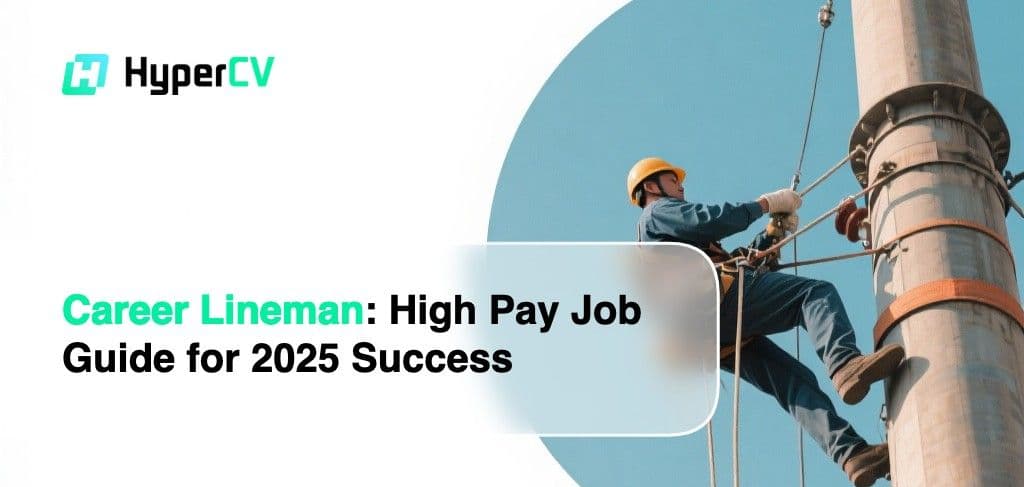Career Lineman: A High-Paying Path to Financial Security

Choosing a career lineman path might be one of the smartest decisions you can make in today's job market. While everyone talks about tech jobs and college degrees, electrical linemen are quietly building wealth and securing their futures with solid paychecks and excellent benefits.
What Makes a Career Lineman So Valuable?
Every time you flip a light switch, a career lineman made that possible. These skilled workers climb poles, fix power lines, and keep electricity flowing to homes and businesses. When storms hit and power goes out, linemen are the heroes who restore electricity, often working in dangerous conditions to help their communities.
According to industry research, the demand for qualified linemen is growing due to expanding electrical networks and the need for maintenance, especially after storms or disasters. More than just a paycheck, this career offers job security, career advancement, and the fulfillment of truly serving your community.
The best part? You don't need a four-year college degree to start. Many successful linemen earn more than people with expensive college degrees, and they have job security that's almost impossible to find elsewhere.
Real Income Numbers for Career Lineman Positions
Let's talk about the money because that's what many people want to know. Recent data shows that the average annual salary for electrical linemen was $85,900 in 2023, with top earners making over $115,000. A career lineman can earn impressive wages:
- Starting apprentices: $40,000-$60,000 per year
- Journey-level linemen: $80,000-$120,000 annually
- Experienced storm chasers: $200,000-$300,000+ per year
- Local utility workers: $100,000+ with regular hours
One apprentice shared that he made $187,000 in his second year, working about 50 hours per week. That's more than many doctors or lawyers make right out of school.
| Experience Level | Base Salary Range | With Overtime Potential |
|---|---|---|
| Apprentice (1-2 years) | $40k-$60k | $60k-$80k |
| Journeyman (3-5 years) | $80k-$100k | $120k-$150k |
| Senior Lineman (5+ years) | $100k-$130k | $180k-$250k |
| Storm Chaser | $120k+ | $250k-$350k+ |
How to Start Your Career Lineman Journey
Getting started as a career lineman is more straightforward than you might think. Modern training programs focus on safety, climbing, electrical theory, and equipment operation to prepare students for the demands of the trade. You'll need about a year of training, which includes:
Trade School Training: Most programs last 12-18 months and cover electrical theory, safety procedures, and hands-on practice. The training is intense but practical. Organizations like L.I.N.E. and American Lineman College offer specialized programs that emphasize modern technology integration and safety-conscious practices.
Apprenticeship Program: After trade school, you'll work as an apprentice for 2-4 years. During this time, you earn while you learn, getting paid to develop your skills under experienced linemen. For example, Portland General Electric's apprenticeship program starts at over $30 an hour with benefits from day one.
Physical Requirements: The job demands physical fitness. You'll climb poles, work with heavy equipment, and spend long hours outdoors in all weather conditions.
Different Types of Career Lineman Work
Not all career lineman jobs are the same. You can choose the path that fits your lifestyle:
Local Utility Companies offer steady work with regular schedules. Many linemen work for their hometown electric company, maintaining local power systems and responding to outages in their area.
Storm Chasing involves traveling to areas hit by hurricanes, ice storms, or other disasters. These jobs pay extremely well but require being away from home for weeks or months.
Construction and Maintenance work focuses on building new power lines and upgrading existing systems. This work is steady and often involves working on large projects. With industry leaders emphasizing mentorship and hands-on experience, there are clear pathways for career advancement into roles like troubleshooting, system operations, and leadership positions.
The Reality of Career Lineman Work
Being honest about the challenges is important. A career lineman faces real risks and demands:
Safety Concerns: Electrical work is dangerous. Linemen work with high voltage electricity, often at great heights. Safety training is extensive, but accidents can happen. OSHA guidelines and safety protocols are essential parts of the job.
Physical Demands: The work is tough on your body. Many experienced linemen need knee or shoulder surgery after years of climbing and heavy lifting. The role requires strong physical fitness, stamina, and the ability to handle heavy equipment safely.
Work Schedule: When storms hit or power goes out, linemen work until the job is done. This might mean 16-hour days during emergencies.
Weather Conditions: You'll work in rain, snow, ice, and extreme heat. When everyone else stays inside during bad weather, linemen go to work.
Despite these challenges, most career lineman professionals say the benefits outweigh the negatives. The pay is excellent, the work is meaningful, and job security is outstanding.

Why Career Lineman Jobs Are Future-Proof
While robots and AI threaten many jobs, being a career lineman is incredibly secure for several reasons:
Essential Service: People will always need electricity. No matter what changes in technology, someone needs to maintain the power grid.
Complex Problem Solving: Each power outage or repair job is different. Linemen must think on their feet and solve unique problems that robots can't handle.
Extreme Conditions: Machines can't safely work in the dangerous, unpredictable conditions that linemen face daily.
Growing Demand: Climate change means more severe weather, which creates more work for linemen. The aging power grid also needs constant upgrades and maintenance. Industry experts project 8% job growth from 2023 to 2033, indicating steady demand for skilled workers.
Building Your Career Lineman Resume
When you're ready to apply for positions, your resume needs to show you're serious about safety and have the right training. Professional resume guides for lineman positions emphasize the importance of showcasing both technical knowledge and soft skills like agility, attentiveness, and willingness to work under stressful conditions.
Here's what employers look for:
- Completion of accredited lineman training program
- CDL (Commercial Driver's License)
- Physical fitness and ability to work at heights
- Willingness to work overtime and travel
- Clean driving record and background check
- Basic electrical knowledge and mechanical skills
- Familiarity with OSHA safety guidelines
Many successful linemen started with no experience but showed they were reliable, safety-focused, and willing to learn. Employers often care more about your attitude and work ethic than your previous experience. Gaining relevant certifications and completing apprenticeships can significantly enhance your resume and job prospects.
Regional Differences for Career Lineman Opportunities
Where you work as a career lineman affects your pay and opportunities. Some states and regions offer better conditions:
High-Paying Areas: California, New York, and Alaska typically offer the highest wages due to cost of living and union presence.
Storm-Prone Regions: Texas, Florida, and Gulf Coast states provide lots of storm work opportunities.
Union vs. Non-Union: Union jobs generally offer better pay, benefits, and job protection, but they can be competitive to get.
Rural vs. Urban: Rural areas might pay less but offer lower living costs and tight-knit work communities.
Making the Most of Your Career Lineman Path
Smart linemen think long-term about their careers. Here are strategies successful professionals use:
Save During High-Earning Years: Many linemen work intensively in their 20s and 30s, saving money for when they want to slow down or move to easier positions.
Consider Specialization: Some linemen become specialists in areas like relay work or substation maintenance, which can offer better schedules and pay. The industry now offers specializations in high-voltage lines and renewable energy systems.
Plan for Physical Limitations: Having a long-term plan for when the physical demands become too much is crucial for career longevity.
Network Within the Industry: Building relationships with other linemen, supervisors, and contractors opens doors to better opportunities.
Take the Next Step in Your Career Lineman Journey
A career lineman offers financial security, job satisfaction, and the chance to do meaningful work that helps your community. While the job has challenges, the rewards are substantial for those willing to learn and work hard. Proper training programs not only enhance competitiveness but also prepare workers for high-paying roles while improving safety standards.
If you're ready to pursue this career path, the first step is creating a professional resume that showcases your commitment and potential. HyperCV can help you build a compelling resume that highlights your strengths and gets you noticed by employers in the electrical industry. With the right resume, you'll be ready to start your journey toward a high-paying, secure career as a lineman.
The power industry needs skilled, dedicated workers, and with proper training and the right resume, you could be earning six figures within just a few years. Don't let this opportunity pass you by – start building your career lineman future today.